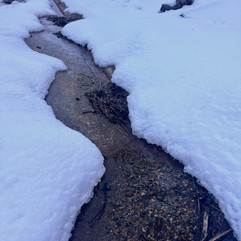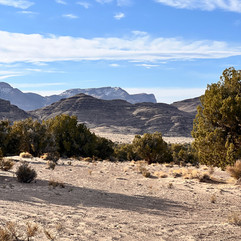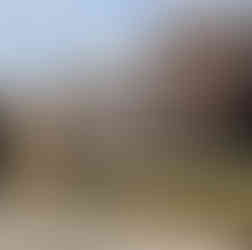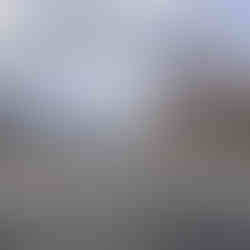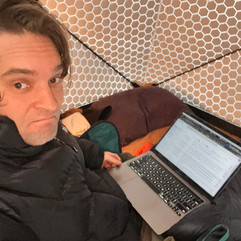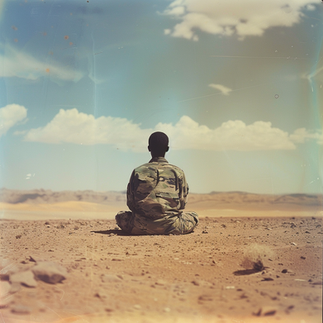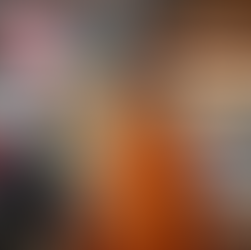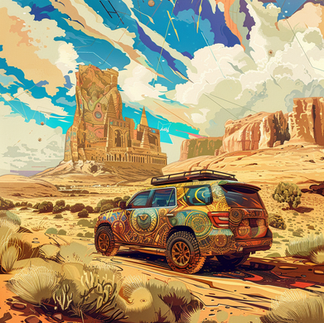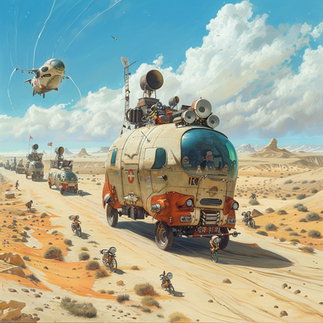- Jay Standish
- Apr 6, 2024
- 5 min read
Week One
I started my cross-country road trip from Oakland, my home. My friend Adam and I shared friend chicken sandwiches, our ennui evaporating under the warming sun. I was ready to start the trip, but sad to say goodbye to my friend (and ten other friends this night before).
I made my way swiftly up to South Tahoe in just over 3 hours on a clear late March afternoon. I listened to the new Beyonce album, and the first song immediately reminded me of the Beatles. I also listened to this lofi jazz album which was playing as I got higher up into the Sierra and it began to snow.

I was hosted in Tahoe by my friends Chelsea and Derek who are also co-authors of an upcoming book that we're writing. We got some work done, and also had some meandering conversations amongst the trees. Derek came out of the closet as a vegan, which we've all known for a long time.
After two nights at altitude, it was time to descend into the dry of Nevada. I called my mom on the east coast as I rolled down the back side of the Sierra. We had been together on the same road a few months earlier, and she cajoled me into driving safely.

Nevada beckoned me down two lanes with a double yellow: Route 50: "The Loneliest Highway." Each arid valley was followed by a set of gorgeous but anonymous mountains. Then another wide valley floor would erase the last, one after the other, all day, like unrelenting waves of earth. Only a few small towns dared to eek out an existence and brave that loneliness.
As the afternoon threatened an end to the day, I pulled over to research a place to camp. If you've never car-camped in the American West, freedom still exists here. There are vast tracts of land owned by you and me, and managed by the Bureau of Land Management. You can camp on your land with no permits for up to two weeks at a time in each spot. I found a spot on a trusty app that was just over the Utah border and had a nice network of dirt trails to find a camp spot. I doubled back toward the main road over a short, well-groomed dirt road, with a destination set for my hopeful camp's Lat/Lon.
I found the turnout and kept my momentum going through soft, sandy conditions. I raised two fingers from my wheel to acknowledge the two smirking old buddies having a beer as I passed their rigs. The sand got even softer as I climbed the hill, and I decided to loop back while I still could. My car barely has AWD, and I respect it's boundaries. I camped in the lee of a big juniper, and made haste to set up as the sun's death threats were now coming to fruition. I looked back west toward California, and felt the distance.

I tried to set up my satellite internet, but hadn't paid for an account yet, so I was relegated to a final bar of 5G E at the top of the hill, which I used to let a few friends know I had made it home. I cheated and made an instant camp dinner, brewed a liter of tea for my thermos, and burrowed into my space-age shelter.
The next morning I packed up camp and was on the road by 9am. As I drove deeper into Utah, the valleys got greener and farmers started to make use of them. The clusters of houses became larger, and slowly I found myself in civilization at the bottom of the Utah Valley. My destination was Spanish Fork, where I would meet with a small business owner who had converted his auto repair company into employee ownership.
I met Kevin in the office above one of the repair shops, and we talked shop about steward-owned holding companies and other topics from the book I'm writing. I booked a cheap hotel room, had a shave and shower and then headed for the edge of town and found a trailhead parking lot where I finally got my satellite internet set up. The next day, Kevin and I met up for lunch and he told me about a program he launched for the blue-collar staff at his company to unpack what they care about and find more purpose. I walked away one friend richer, and made my way southward.
I had researched an open camping spot near a hot spring, but found myself going further up a dirt road, and made Camp # 2 at higher up the mountain. It was cold and windy, and I felt some deep pangs of loneliness as I rushed to make mac and cheese. I went to bed early and woke up late, relishing in my winter-rated down bag. Just as I was putting my shoes on to get up, what seemed like rain drops began gently thwapping the tent. I opened the door to scope, and an inch of dry, fluffy snow had fallen without me realizing.
I managed to get some laptop work done while it continued to snow and the snow stopped around 11am, and the snow started warming up. I checked the weather, and it seemed like it would thaw, and then get cold again. My water jug was partially frozen, and between that and the prospect of the dirt roads getting muddy, I made aggressive moves to decamp for better conditions. I was planning to meet with a friend the next day all the way south in Utah near Zion National Park, so I figured south and lower elevation would be the remedy.

Armed with local intel, I made Camp # 3 on the edge of a mesa with a theatrical view of Zion. Still windy and cold, I felt a bit sad arriving at this miraculous vista without anyone to enjoy it alongside me. I trudged on with setting up my gear, and ate dinner sitting on a big rock and was finally able to enjoy the view, noticing my vision soften and allow more detail to hit me. I remembered a dharma talk I had listened to that morning about how all the feelings that we want can be mustered inside ourselves. This sentiment felt true but out of reach as I sat there hoping that the beauty of the landscape would spark some inspiring feeling. I saw my folly in reaching for it, and also know these things take time. I made a little fire after sunset and the rhythm of the day gave me what I needed.
And so, we keep going. Out of my comfort zone. Into the world. One week in.














